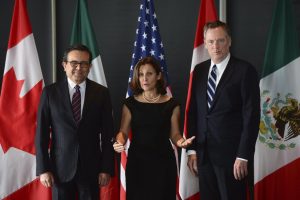 Mexico has shot down a U.S. proposal to include provisions that would be beneficial to AT&T in the North America Free Trade Agreement, said the Economy Minister of Mexico Ildefonso Guajardo.
Mexico has shot down a U.S. proposal to include provisions that would be beneficial to AT&T in the North America Free Trade Agreement, said the Economy Minister of Mexico Ildefonso Guajardo.
Guajardo said that North American based AT&T asked its government to look out for its interests in these negotiations, but he did not specify details of the proposal by the U.S.
Guajardo added that you could not reach an agreement that gives perfect handiwork to one specific company.
Mexico’s telecommunications reform of 2013-14 was aimed at breaking up the America Movil dominance in the industry, America Movil is owned by Carlos Slim, a billionaire from Mexico.
Negotiations continue to ensure the reform will be included in the new agreement, said Guajardo.
Attracted by the telecommunications reform, AT&T in 2014 entered the market in Mexico, spending over $4.4 billion to acquire the No. 3 and No. 4 Mexico carriers.
However, the market then plunged into big uncertainty this past August when the Supreme Court of Mexico ruled that America Movil should not be barred by law from charging for calls made to its network by rivals, weakening the reform’s key pillar.
That turmoil spilled into the negotiations taking place for NAFTA. Guajardo said that has kept the telecoms chapter open as it had been contaminated somewhat by the debate about zero-rate.
The reform in Mexico in telecommunications sharply lowered the prices for consumers. It is one the signature accomplishments of current Mexico President Enrique Pena Nieto. However throughout the current NAFTA negotiations, Mexico has rejected on a consistent basis proposals that would isolate the country, say trade experts.
A senator in Mexico said that what was surprising related to the telecommunication proposal we are negotiating a principle as three nations, but then all of a sudden the U.S. makes a proposal that demands specific commitments from Mexico that converts this negotiation into one that is bilateral.
Mexico enthusiastically wants to enshrine an energy reform from 2014 into NAFTA, but with the condition the language applies to the three countries.
He added that Mexico is not looking to be singled out.
